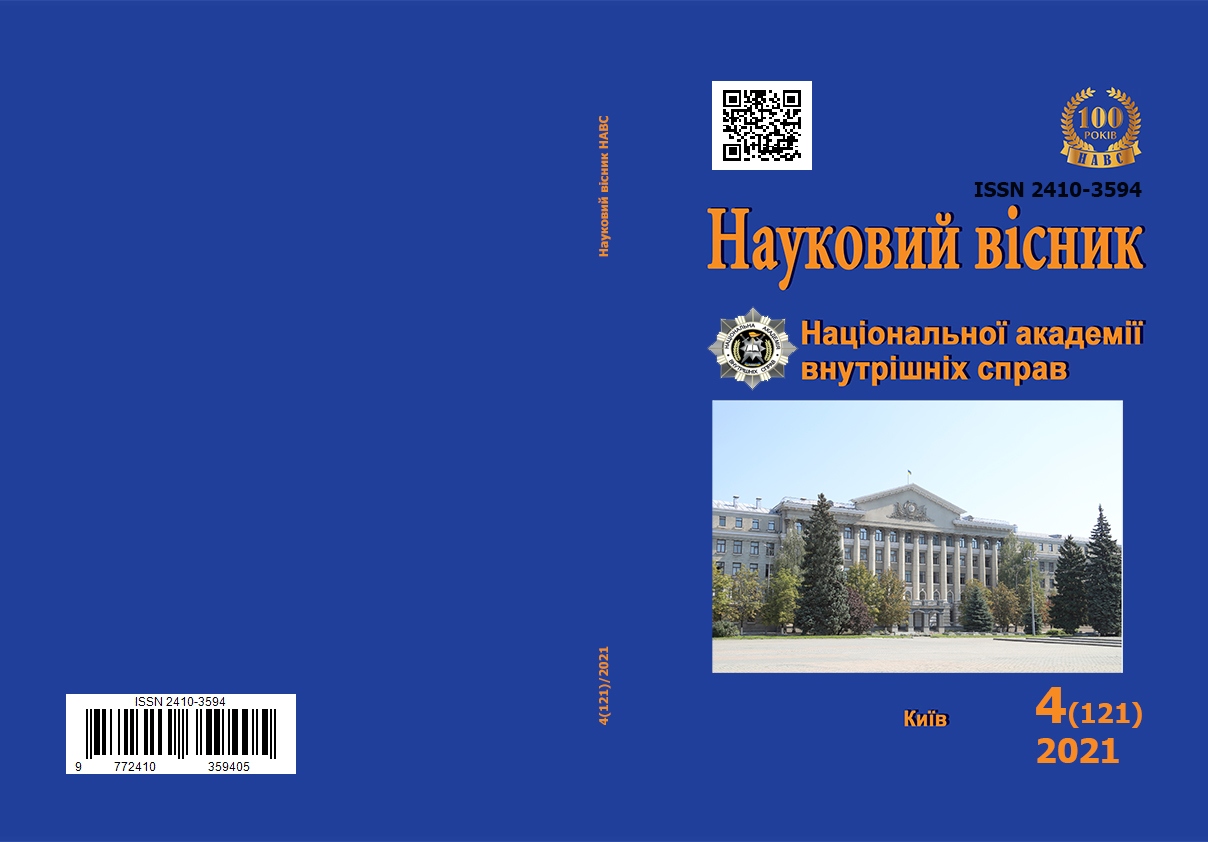Detention by an Authorized Official in a Person’s Home or other Property: Current Issues of Theory and Practice
Abstract
The purpose of the article is to analyze problematic issues of the criminal procedure for detention in housing or other property of a person and the formation on this basis of scientifically sound recommendations for improving existing legislation and practice of its application. Methodology. The article uses a set of scientific methods, namely: terminological, system-structural, formal-logical, comparative-legal. The theoretical basis of the study are the works of Ukrainian scientists, the provisions of the Criminal Procedure Code (CPC) of Ukraine, as well as the practice of its application. The scientific novelty of the article is that it highlights the features of detention of a person who is in the home or other property of a person, formulates recommendations for the application of the relevant provisions of the CPC of Ukraine in practice, and identifies areas for improving criminal procedural law. actions. Conclusions. Based on the results of the study, a set of proposals aimed at improving the provisions of the CPC of Ukraine regulating the procedure for detention in housing or other property and the practice of their use, in particular: 1) necessary grounds for both intrusion and detention in a person’s home or other property, as in fact these are different procedural actions;
2) in case of detention by an authorized official without the decision of the investigating judge, court, physical detention or detention by order may be carried out by all police officers in accordance with the Law of Ukraine «On National Police», as well as other law enforcement officers. drawing up a detention report, only the investigator, prosecutor has the right (given the above provisions of the CPC of Ukraine need clarification by a clear delineation of detention, which includes the full range of measures from physical detention to drawing up a protocol and physical detention); 3) Art. 208 of the CPC of Ukraine should provide for the provision that physical detention or detention by order may be carried out by law enforcement officers, in the presence of legal grounds specified in Part 1 of Art. 208 of the CPC of Ukraine, and procedurally formalize these actions can only authorized officials - investigator, prosecutor; 4) at the legislative level, it is advisable to provide for the possibility of detention on suspicion of committing a criminal offense before entering data into the Unified Registry of Investigations; 5) it is necessary to expand the emergencies provided for in Part.3 of Art. 233 of the CPC of Ukraine, by granting the right to the investigator, investigator, prosecutor to decide on the decision of the investigating judge to enter the home or other property of a person in urgent cases involving detention of a suspect, accused in order to get him to participate in the consideration of the request for the application of a measure of restraint in the form of detention.
Keywords: detention; authorized official; home; other property of the person; intrusion into a person’s home or other property; search; inspection; investigator.
Downloads
References
Давиденко С. В., Мавдрик Д. О. Проблеми вдосконалення правового регулювання процедури проведення обшуку слідчим, дізнавачем, прокурором. Актуальні проблеми держави та права. 2021. № 90. С. 51–63. doi: https://doi.org/10.32837/apdp.v0i90.3207.
Калугін В. Ю. Правова регламентація невідкладних випадків проникнення до житла чи іншого володіння особи в ході досудового розслідування. Організаційно-правові аспекти досудового слідства. Південноукраїнський правничий часопис. 2020. № 3. С. 159–163. doi: https://doi.org/10.32850/sulj.2020.3.28.
Лучко О. А. Співвідношення огляду з обшуком у кримінальному досудовому провадженні. Європейські перспективи. 2020. № 3. С. 117–121. doi: https://doi.org/10.32782/EP.2020.3.17.
Породько В. В. Правові засади проникнення до житла в позасудовому порядку. Юридичний науковий електронний журнал. 2020. № 9. С. 59–62. doi: https://doi.org/10.32782/2524-0374/2020-9/12.
Сачко О. В. Проблеми реалізації верховенства права при застосуванні особливих форм та режимів кримінального провадження : монографія. Дніпро : Дніпр. нац. ун-т ім. О. Гончара ; Середняк Т. К., 2018. 222 с.
Слідчий та прокурор постануть перед судом за незаконне затримання. URL: https://dbr.gov.ua/news/slidchiy_ta_ prokuror_postanut_pered_sudom_za_nezakonne_zatrimannya.
Судді ККС ВС розповіли про можливості удосконалення досудового розслідування. URL: https://supreme.court.gov.ua/supreme/prescentr/news/1010096.
Ухвала Касаційного кримінального суду Верховного Суду України від 16 січ. 2021 р. у справі № 204/6541/16-к. URL: https://reyestr.court.gov.ua/Review/95533196.
Відсутність підстав для затримання особи, передбачених КПК України, є однією з ознак її незаконного затримання. URL: https://supreme.court.gov.ua/supreme/pres-centr/news/759146.
Вознюк А. А., Грига М. А., Дуда А. В. Порядок проникнення до житла або іншого володіння особи: актуальні проблеми теорії та практики. Науковий вісник Національної академії внутрішніх справ. 2021. № 2 (119). С. 68–82. doi: https://doi.org/10.33270/01211192.68.
Затримання уповноваженою службовою особою : метод. рек. / [А. А. Вознюк, О. С. Осетрова, О. Ю. Хабло та ін.] ; за заг. ред. С. С. Чернявського. Київ : Нац. акад. внутр. справ, 2019. 64 с.
Abstract views: 172 PDF Downloads: 113
- Authors reserve the right to authorship of their own work and transfer to the magazine the right of the first publication of this work under the terms of the Creative Commons Attribution License, which allows other persons to freely distribute published work with mandatory reference to authors of the original work and the first publication of an article in this magazine.
- Authors have the right to enter into separate additional agreements on non-exclusive dissemination of the work in the form in which it was published in the journal (for example, to post an article in the institution's repository or to publish as part of a monograph), provided that the link to the first publication of the work in this journal is maintained.
- The journal's policy allows and encourages the posting of articles by authors on the Internet (for example, in electronic storehouses of institutions or on personal websites), both before the submission of this manuscript to the editorial office and during its editorial processing, as this contributes to the creation of a productive scientific discussion and positively affects the efficiency and dynamics of citing the published work.




